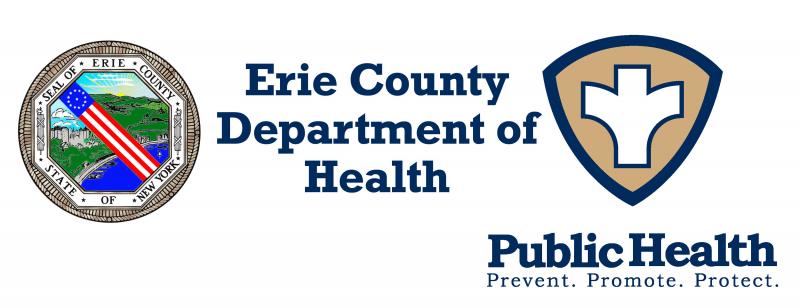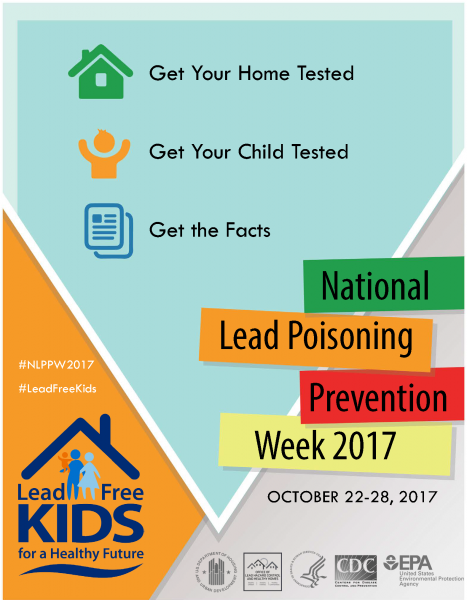Modified: October 20, 2017 4:46pm
Latest News

PRESS RELEASE
From the Office of the Commissioner of Health, Dr. Gale R. Burstein
Date October 20, 2017
CONTACT: Mary C. St. Mary/Mary.StMary@Erie.Gov
Phone: 716.858.4941/ Mobile: 716.253.3925
National Lead Poisoning Prevention Week
Renovate Right! Protect Families and Tenants from Exposure to Lead Paint Dust & Chips
ERIE COUNTY, NY—National Lead Poisoning Prevention Week is October 22-28, 2017. Year-round, the Erie County Department of Health’s (“ECDOH”)
Division of Environmental Health educates residents about the dangers of lead and lead poisoning prevention techniques.
With the Buffalo housing stock being among the oldest in the nation, the most common source of lead exposure is lead-based paint found in houses built prior to 1978. The threat of lead poisoning from young children ingesting or inhaling lead chips or dust remains a very serious public health challenge.
“Lead poisoning is entirely preventable by eliminating children’s lead exposure,” said Dr. Gale Burstein, Erie County Commissioner of Health. “Exposure to lead, even in very small quantities, can cause learning disabilities, behavioral problems, and, at very high levels, seizures, coma, and even death. Young children, especially younger than 6 years old, when exposed to high lead levels in house dust, are particularly vulnerable. Childhood lead exposure adverse health effects are irreversible.” Blood lead level (“BLL”) tests measure the amount of lead in the blood. Children should be tested at age 12 and 24 months and more frequently in certain circumstances. Parents should talk with their child’s primary care provider about lead exposure risks and testing.
Working ‘Lead Safe” when cleaning, painting, or making other home repairs is an effective way to protect your child from lead exposure. Environmental Health is hosting 4 free workshops geared to help families work safely when repairing or renovating pre-1978 homes. These workshops will teach homeowners and occupant families how to perform repairs/renovations using Lead Safe work practices.
NOTE: Registration is required; call Environmental Health at 961-7582. Information on the workshops is also available on the ECDOH Facebook page: www.facebook.com/ecdoh, under “Events”.
|
Fixing Older Homes Using Lead Safe Work Practices Workshops |
|
|
Wednesday, October 25th |
1:00—7:00 PM |
|
ECDOH, Environmental Health, 503 Kensington Ave., Buffalo 14214 (behind ECMC) |
|
|
Thursday, October 26th |
6:00—10:00 PM |
|
Valley Community Center, 93 Leddy St., Buffalo 14210 |
|
|
Saturday, November 4th |
9:00 AM—1:00 PM |
|
Delavan Grider Community Center, 877 E. Delavan Ave., Buffalo 14215 |
|
|
Wednesday, November 8th |
5:00—9:00 PM |
|
Unitarian Universalist Church, 695 Elmwood Ave., Buffalo 14222 |
|
(These “How to” seminars are for homeowners, not commercial contractors or property owners/managers as they do not meet EPA Renovate, Repair & Painting certification requirements)
Lead Poisoning Prevention Tips
ü Test your home for lead if your home was built before 1978. Call the Division of Environmental Health for information about home lead testing. If you do not know how the age of your home, assume it may contain lead. Renters can ask the landlord about lead before signing a lease. Home buyers should include lead testing as part of the home inspection.
ü Learn safe ways to make repairs/renovations Call Environmental Health for information about lead-safe training classes for do-it-yourself home owners. Get lead-safe training or use a certified contractor, as removing lead paint can often make the condition worse. If work is not done safely, you and your child can be harmed by increased exposure to lead in dust. Always keep your child away from renovation areas until everything is cleaned up.
ü Keep children away from areas with chipping or peeling paint Cover those old windows, old porches, and areas with duct tape or contact paper until it can be completely removed. If you rent your home, inform your landlord about any peeling or chipping paint. Landlords are legally required to repair lead problems found on their property.
ü Keep children away from dirt/bare earth next to your older home Cover bare soil/earth by planting grass or by using mulch or wood chips to cover the dirt.
ü Clean your home regularly Wipe down floors and other level surfaces with a damp mop or sponge. Taking shoes off at the door can help reduce tracking in dirt and dust.
ü Teach your children to wash their hands, especially before eating Wash pacifiers and toys regularly.
ü Keep clean If your work or hobbies involve exposure to lead, change your clothes and shoes and shower when finished. Keep your clothes at work, or wash your work clothes separately as soon as possible to avoid contamination of other laundry.
ü Eat healthy Give your child a well-balanced diet that includes breakfast and food high in calcium and iron. A good diet can help your child absorb less lead.
ü Test your tap water for lead Lead paint chips and dust are the main sources of lead exposure. If you suspect lead in drinking water, ask your water provider whether your water contains lead. Data on lead in tap water from public water systems may be available on the Internet from your local water authority. To test tap water: in Buffalo, call 311. In the rest of Erie County, call the Erie County Public Health Laboratory at 716-898-6100.
ü Flush the taps! Run COLD water for 1-2 minutes before using it in the morning and anytime it has not been used for 6 or more hours. Always start with cold water for mixing formula, drinking or cooking. Water that comes out of the tap warm or hot can contain much higher levels of lead. Boiling water will NOT reduce the amount of lead in your water.
“Our dedicated team of public health sanitarians and public health nurses are ready to assist any Erie County family in need to help them avoid or eliminate a lead exposure problem,” concluded Burstein.
# # #
For More Information:
Erie County Department of Health
Centers for Disease Control and Prevention
Environmental Protection Agency (EPA)
American Academy of Pediatrics
National Center for Healthy Housing
U.S. Department of Housing and Urban Development

